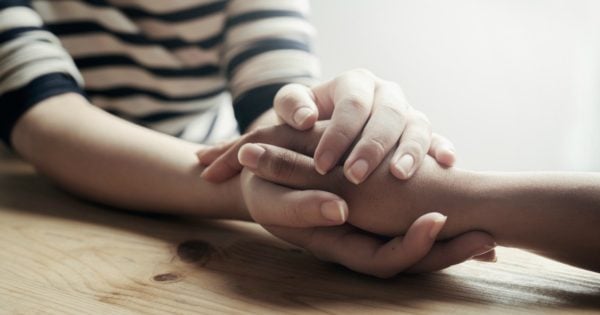A lot is written about the grief a parent is left with after the death of their baby, but let’s throw the net a little further and start to look into how society then deals with the conversations and expressions in and around that grief.
In my experience, unfortunately the prevailing clichés hold some truth – people do avoid talking about grief, specifically when that grief relates to child loss, stillbirth and infant death. The invisible deaths.
In relation to these types of losses, there seems to be some unwritten rules you must adhere too. The prevailing feeling is that the bereaved parent must wrap up their grief in what western society has deemed an appropriate amount of time (you can pull any arbitrary number here you like), and once the grief window has expired, you’re best to try not to talk about it in public. Doing so will only make others uncomfortable and it projects that you’re not really ‘over it’ adequately if you still bring it up in polite conversation.
For anyone going through grief, this is the book for you. Post continues…
So, let’s talk why it makes others uncomfortable. The death of a baby is such an emotionally charged type of grief, it’s a grief that if you haven’t had personal experience with it, it is very hard to fathom the very real and lasting toll it takes on you, both as a parent but as a person as well.
Are you the type of person that would hesitate bring it up in conversation because of the unsure footing it brings? Don’t be, don’t sit on the fence. Be the friend who asks how they are in relation to their grief, but do it with tact. Trust me, most bereaved parents will appreciate the sentiment and forgive any fumbles. They may want to talk about, they may not. They may cry, they may not. You may be surprised at how much insight a bereaved parent is able to express when reflecting back about their experience.


Top Comments
I want to see more about this. I want to read more about this. I want others to see more about this.
Some Mamamia readers might recognise my name here. My daughter was born asleep, at an overdue 41 weeks, on June 25. I am appalled at the lack of knowledge I had surrounding miscarriage, stillbirth and neonatal death as a pregnant woman. It is awful that I had never heard that 6 babies are stillborn every day, it's just insane. And now, dealing with our grief, I feel like our friends really dont know how to handle us. Really, its okay not to know, I just wish they werent afraid to ask not just how we are doing, but about HER as well. She is still our baby, even if she isn't here right now. Thats what hurts, its like we arent really parents in their eyes, like we should be the people we were before we were ever pregnant. We will never be those people again, we are parents and we have been torn apart by grief. I will always want her to be a part of my life, and I will try to continue to make her a part of my life and conversation. I am afraid of the day people in my life forget about her. Besides, its an awful feeling to not know if I should talk about my baby for fear of making YOU uncomfortable. Its worse than the grief itself and only compounds our grief!
Hi Banshee, You are so right, there is so little information on how to approach the subject with bereaved parents that it so often becomes the bereaved parent comforting the other person. I know this was certainly true for my experience as well. Hopefully the more bereaved parents are able to develop the discussion around the grieving process and support networks, the more those who haven't experienced stillbirth or infant death can know how to respond. Till Xx
My sons third birthday is fast approaching and I desperately hope this article is read by my friends and family. Why? Because my son passed away when he was just days old and I the only thing that upsets me more than the anniversary of both his birth and death is that those closest to me often choose to ignore these days and give me and my partner a wide berth, or worse forget altogether. My bad days are now less than the good but that doesn't mean I have 'moved on' or love and miss him any less.
It can be so difficult when the flowers stop, when it's easier for others to just avoid the conversation. They can put it to one side, but as a mother it never gets 'easier'.
It has also been three years since my daughters death, so I understand how that number feels.
I hope you and your partner can support each other, even if others are too uncomfortable to acknowledge the love you have for your son. There are also a number of support services for bereaved parents which you may find useful on those tough days. Take Care.
Mos, I am so sorry to hear your story, because I can relate to most of what you have said. While I did not endure the trauma of losing a newborn, my daughter died when I was 4 months pregnant. Barely any of our friends acknowledge this, and I want to think it's because they are trying to be polite under the misguided belief that talking about her will 'upset' us. Realistically though, I think our society sets most of us up for being pretty average at dealing with death. Sending love and hugs to your family, and to your beautiful boy x